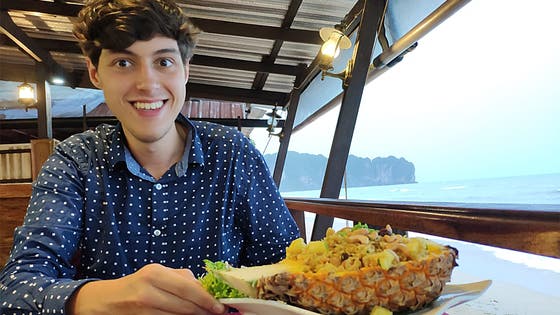Jaber Asaksak: ‘We have a social responsibility to make our education accessible’.

The new student assessor Jaber Asaksak talks about diversity, the growing role of technology and his expectations for the coming academic year.
‘My role in the diversity working group started off without any obligation. I just e-mailed vice-dean, director of Education. Prof. dr. Berent Prakken and asked how I could contribute to the topic. I then met Renee, the student assessor, in the workgroup. Renee regularly asked questions about my experiences as a student. For example, what did I think about the introduction orientation day and how was I experiencing university as a student of Moroccan descent who doesn’t drink? Not long after our conversations, she presented a plan in which she converted my experience into policy. I thought that was fantastic. That's how everything started.
When I first arrived at uni, coming straight out of my VWO, I had no idea there was such a thing as a student assessor. In the first year of medical school, I was asked to be a representative for my fellow bachelor's students. I think it’s a shame that I turned down that role. Student representatives pass on students' opinions and ideas to the student assessor, who in turn can help make these into policies. However, I am now ready to take on this position and bring fresh eyes and ideas to this role.
As die hard geek, I waivered for a long time between Computer Science and Medicine. I assemble my own computer and have optimised my room with smart Hue lighting that I control with voice commands via Google Assistant. In terms of technology, a lot is happening within the study programme, but I want it to be included more into education. How cool would it be if we could prepare students via virtual reality? Send medical students into a virtual operating room, with a surgeon to explain. Or walk around freely in a life-size anatomical 3D model. Technology goes further than just teaching materials. For example, doctors are already dealing with worried patients because their Fitbit continuously shows 120 on the heart rate monitor. How do you deal with that? I want to delve deeper into these kinds of issues’.
‘How great would it be if we could prepare students via virtual reality’?
‘I will also continue to work on diversity. What shocked me last year is that primary school children disqualify themselves as doctors. They don't see themselves as doctors. This not only has to do with ethnic background, but also with, for example, a disability. These children are very smart and go through so many steps to successfully complete VWO, but becoming a doctor often remains unrealistic for them. Why is that? As a study programme, we have a social responsibility to change that. Renee is already busy with that. Hopefully, at the end of this year, I can produce a graph that shows that our education at the UMC Utrecht has become more accessible.
I attach great value to the above goals, but to be honest, I don't know yet what a student assessor does exactly. Renee has focused her energies on different issues than Joni (who was assessor before her), and I will most likely work differently than Renee. You get a lot of freedom in designing the role. I think the most important task is listening to students and representing their opinion. That is a serious responsibility. Renee is very good at measuring the opinions of students and employees. Almost all employees know her. She got to know the organisation in a short time and is not at all sensitive to hierarchy, so she can walk in everywhere. Accessible collaboration is certainly important. If people have an idea, I want them to be able to easily contact me.
As a student assessor, you let go of some of your executive tasks and you get to work on making policies. I organised information evenings at the study association IFMSA. That was very practical. In addition to my assessor responsibilities, I was able to go crazy for two years in the cooking committee. My specialisation is Moroccan cuisine. Once every two months, a dinner was organised for 25 people for ten euros including drinks. Very nice and cosy. Besides cooking and technology, I can also call walking a hobby. I live on the Uithof and I love to go for a walk in the evening. I regularly hear negative comments about the buildings here, but I can really appreciate the patchwork of different architecture. There is a lot to see and nature nearby’.
